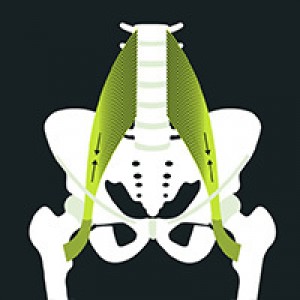LUMBAGO
Have you suddenly found you can barely move and have lower back pain? You might have lumbago.
If you’ve ever had lumbago before, you’ll know how painful it is. The severe pain combined with limited mobility can leave you hunched over for a couple of days. If the pain is radiating to your legs, doctors refer to this as lumbago with sciatica.
According to the results of a back pain study in Germany, 85% of the population get lumbago at least once in their lifetimes. What’s especially interesting is that it doesn’t necessarily affect older people: it’s mostly found in the 30 to 50-year-old age group.
WHAT IS LUMBAGO?
Acute lumbago is when the function of your back muscles is limited, usually in the lumbar spine region. It often happens with everyday movements like lifting, bending, or getting up from a seated position. Lumbago is the body’s way of protecting itself – it’s a reflex response where your lower back muscles tense up. This protects the spine and nerve fibers from injury. The increased tension causes the usual symptoms of restricted movement and pain, but also brings greater sensitivity to pressure in the lumbar spine region. Good to know: lumbago doesn’t damage your spine. Your doctors won’t find any changes in “passive” structures such as vertebrae, discs and ligaments.
That’s why lumbago is often categorized as non-specific back pain. It includes about 80% of acute and chronic back pain. Non-specific means that the cause of the pain is unknown. Why? Because conventional diagnostic procedures generally don’t reveal muscle tightness, fascial adhesions and myofascial imbalances.
LUMBAGO SYMPTOMS
The most obvious feature of lumbago is sudden, severe pain in the lower back. The pain is often spread out, and everyone describes it differently. In any case, you’ll barely be able to stand upright or move around normally, if at all. The reason for these symptoms? Your severely overloaded back muscles and fascia need to work even harder when you’re upright. This sends pain signals to your brain.
The back pain usually subsides within a couple of days. Still, it’s important to make sure you don’t have any neurological damage or any indication of a herniated disc, both of which must be taken seriously.
Talk to your doctor right away if you have any of these lumbago symptoms:
- Tingling or numbness (especially in your leg(s))
- Complete loss of sensation
- Loss of motor control (inability to control your physical movements)
- Loss of bowel or bladder function (wetting yourself or unable to control your bowel movements)
- Severe inability to move and/or inability to walk (not to be confused with movements that are painful but still possible)
WHAT CAUSES LUMBAGO?
- Frequent sitting or staying bent forward: if you often sit bent forward, you create an imbalance in the biomechanics of your pelvis and spine. That’s because sitting makes muscles and fascia on the front of the body harder and less pliable over time. In other words, it is as if they are “shortening”. The muscles that enable your abdomen and hip to bend exert a strong pulling force on your pelvis and lower back. The back and buttock muscles try to counteract it. If this imbalance is so severe that the body can’t compensate any more, you get the muscle guarding that’s typical of lumbago. This is actually a good thing: this natural warning sign from the body alerts you to the imbalanced tension and protects you from irreparable damage to your spine.
- Muscular weakness as a cause of your restricted mobility: it might also be that your deep, stabilizing core muscles are too weak and you can’t restore the myofascial balance between the front and back of your body, as described above. In that case, if you make a jerky movement – like lifting a drinks crate – your back muscles will tense up as a reflex to protect your spine.
DR. TORSTEN PFITZER, HOLISTIC PAIN THERAPIST AND HEALTH COACH:
“Despite common misconceptions, the herniated disc is not usually the root cause of lumbago: it is the painful tightening of muscle fascia. In these cases, special exercises at home loosen up the tissue. This restores myofascial balance and can offer excellent results.”
LUMBAGO TREATMENT
1.Rest during the acute phase.
When the pain is acute, there’s not much you can do other than rest and give your body a break. With acute cases of lumbago, relieving pressure on the lower back muscles can help alleviate symptoms. There’s a really easy way to do this: lie down on the floor on your back and place your legs on a chair or stool. Heat from a hot water bottle or heat patch can also help with lumbago.
2. You need to get moving as soon as you’re able to
As soon as you’re able to move again, it’s really important that you do so – even if it hurts a bit. Gentle movement helps treat lumbago by stimulating the tense area and helping it gain nourishment. This will alleviate the discomfort much faster than if you rest it completely.
3. Reduce the tension
Are you able to move well again and with relatively little pain? Then using BLACKROLL® products for your targeted lumbago treatment can really help restore muscular balance. The even pressure you create with self-massage using fascia rollers helps improve nourishment and hydration in the fascia surrounding your muscles. The lumbago exercises act on the central nervous system, which controls muscle tension among other roles. Slowly rolling in a straight line, combined with pressure point techniques, reduces muscle tension. This is important for restoring balance in the pelvis and lumbar spine.
4. Muscle length exercises
You can now make the most of the reduced muscle tension to achieve a targeted increase in mobility in the affected area. While it was tense, the fascial tissue became hardened and lost its natural mesh-like tendency. That tendency is the basis for staying mobile in all directions. By stretching, you can help re-orient the fascial structures, as well as further relaxing them.
5. Strengthening
Muscles that are too weak and inactive tend to become overly tense. By doing targeted strength exercises you will reach the very muscles that can help you restore balance to tensioning structures.
6. Long-term behavior change and non-specific movement
Movement is an often under-appreciated technique for treating lumbago. It doesn’t involve any specific stretching or strength exercises – just things like going for a walk or normal exercise.
The most effective and sustainable factor in your physical activity and general behavior change: stop doing all the things that triggered the problem. To start with, we’d recommend something really easy that you can incorporate into your everyday life: after each meal, get up and go for a relatively brisk, 10-minute walk. This will help you in all sorts of ways – you’ll promote digestion, improve cognitive processes and your circulation, and counteract the effects of sitting down a lot.
PREVENTING LUMBAGO
Ideally, you’ll avoid getting lumbago in the first place. How can you do this? By moving more and with greater balance, and by working promptly against any limitations on your mobility or noticeable poor posture. Reduce movements and postures in your everyday life that shorten the front side of your body. This includes seated positions, typical abdominal muscle exercises where you shorten your muscles, and sleeping on your side with your legs drawn up. Our tip: keep moving in varied ways and prevent problems with the following exercises.
There are no products to list in this category.


